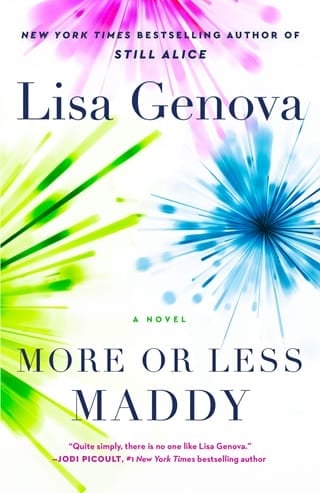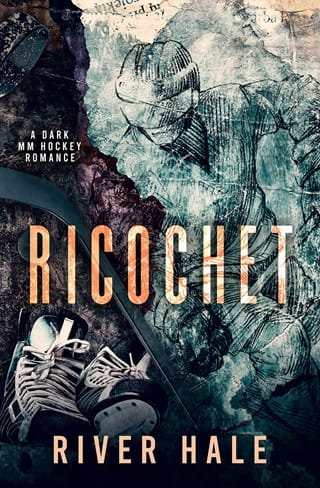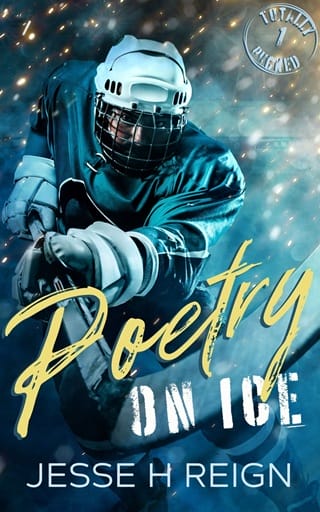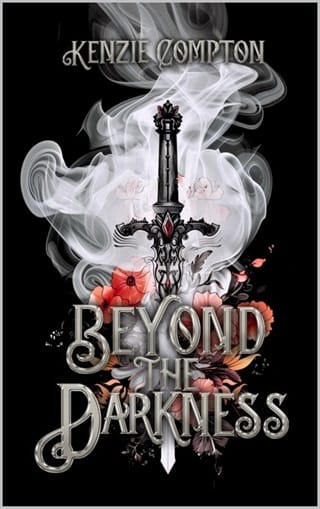Chapter 18
CHAPTER 18
Second semester begins today, but Maddy’s still in Connecticut. Because inpatient hospitalization at Garrison qualifies as a mental health crisis, she’s required to take the next semester off. She fails to see how this blanket policy is helpful to anyone but NYU. They’re just covering their legal asses and protecting their reputation, Maddy’s reputation be damned.
So that’s it. There’s no nuance, no conversation, no exception to the rule. She’s banished. Like a leper. She supposes she’s grateful that they’re only forcing her to take a leave of absence, and she can return in the fall. At other schools, she’d be pressured to withdraw.
She picks up her phone and rereads a text sent from Sofia on Christmas.
SL
SOFIA LOGAN
U ok?
Maddy still can’t bring herself to admit what happened, to type the words. Words would make it all too real. But by not supplying any answer, she’s in effect ghosting Sofia. Like she always does. Maddy is the worst friend.
She scrolls Instagram, uninterested. Normally when she’s bored with nothing to do, she listens to Taylor Swift. But that was BT. Before Thanksgiving. Now, like an alcoholic who can’t risk even the smallest sip of booze, she avoids anything having to do with her favorite artist—her music, her videos, her Instagram account—for fear that it might trigger a relapse.
She listens to other music instead, albums by Selena Gomez, Billie Eilish, and Beyoncé. She loves all of them, but they’re not Taylor. Maddy doesn’t feel the same intimate connection, the enormous love and magic, listening to Lemonade that she feels when she listens to Lover , and that’s not mania talking. That’s the way Taylor makes every one of her millions of fans feel.
But for now, as much as it pains her broken heart, Taylor Swift is off-limits. Maddy can’t take the chance. She’s already nervous. Dr. Weaver started her on a low dose of quetiapine two weeks ago to help with her persistent depression. She assured Maddy and her mother that Maddy’s been on lithium long enough, and while quetiapine has antidepressant properties, it’s actually an antipsychotic drug and not an antidepressant, so they don’t have to worry about it precipitating a manic episode. But what if Dr. Weaver is wrong? Maddy’s been on high alert for any warning signs since.
Still on Instagram, she lets herself stalk Adam’s profile instead of Taylor’s. His most recent photo is a shot of him skiing knee-deep in powder beneath a bluebird sky, framed by a stretch of aspens caked in snow like cream cheese frosting. She spends a long moment with him there, takes a deep breath, and then blocks him. Of course, she’s done this before, and it didn’t stick. But this time feels like a real ending, the book closed.
She realizes she’s singing the lyrics to “We Are Never Ever Getting Back Together” in her head and stops. She waits, listening to her breathing, measuring her heart rate, scanning herself for any kind of transformation, as if she were Bruce Banner about to morph into the Hulk.
But she doesn’t feel a boost of energy, an urge to spend money or write Taylor’s memoir. She feels nothing. She’s empty, a recycled cardboard cutout of a human, alive but also dead. She’s depressed with no signs of relief. The quetiapine isn’t working.
She puts her phone down and stares up at the ceiling. She’s facing too many months, an entire bleak winter and spring in suburban Connecticut with nothing to do, home every day with her mother. If she weren’t already diagnosed with a mental illness, this situation would be enough to cause one.
She opens her laptop. She’s been mindlessly watching TV to pass the time. She’s on season 3 of Gilmore Girls now. A message pops onto her screen, warning her that the battery is low, and her computer will go to sleep soon if it isn’t plugged in.
The charger is on the floor by her desk, all the way on the other side of the room. There’s only one outlet near her bed, occupied by her bedside lamp and her alarm clock, neither of which she needs. She should pull the alarm clock cord and plug her laptop in there. Maddy sighs, liking her plan, but her own battery is depleted by the thought of executing it. Fighting through the inertia that keeps her swaddled in bed, she gets up.
Standing next to her desk, she collects the charger but pauses in front of her backpack on the floor. Aside from when she fetched her laptop and charger, she hasn’t seen the inside of her backpack since Thanksgiving morning. Squatting down, she unzips it. Among other things, it’s crammed full of notebooks.
She pulls out her philosophy notebook and peruses the first many pages, the handwritten notes of a normal college student. All that work for nothing. She slides it back inside.
The next notebook she finds is decorated with photographs of Taylor Swift cut from magazines and taped to the cover. As if it were too hot to hold and burned her fingers, she drops the notebook back into the bag. She waits, eyes wide, breath held, motionless. Nothing happens. She’s still Bruce Banner.
Daring herself to continue, she draws another notebook. This one is labeled C OMEDY #5. She finds one through four. Curious and for some reason not saddled with the same debilitating panic and shame elicited by the Taylor notebook, she carries these and the charger back to bed.
She plugs in her laptop, but instead of resuming Gilmore Girls , she flips through each of the notebooks, not reading yet, simply registering her handwriting on the paper. Each page of all five college-lined notebooks is filled with ink. Jesus. She wrote five hundred pages of comedy in two weeks.
She opens Comedy #5. To her disbelieving horror, page after page is an incoherent, rambling rant. Her bits are disorganized, often angry and offensive, but worst of all, they’re not funny. Not even a little.
There are too many pages to count devoted to making fun of her family, especially her mother, but again, none of it is funny. Worse than that, what little of it that makes sense is mean. She cringes.
How did she think this garbage was good? She opens Comedy #3. Same deal. She closes it, shuffles Comedy #1 to the top of the pile, and opens it to a random page. She assumes it will be similarly horrendous and is about to throw all five notebooks into the trash where they belong when the next thing she reads stops her cold.
I hate thongs. I feel like I’m straddling my naked lady parts on a tightrope wire.
Every time I take a step, it’s like I’m flossing the plaque out of my vagina.
That’s funny. She keeps reading. The next page is funny, too.
The rest of the first and second comedy notebooks is a mix of embarrassingly terrible, not entirely terrible, and not bad. Some sections are even pretty good. Notebooks three through five are lunacy.
With purpose in her step, she walks back over to her desk and retrieves a blank notebook, a black Sharpie, and a fluorescent yellow highlighter from a stack of school supplies that her mother bought Before Thanksgiving for her normal daughter’s next semester at NYU.
Sitting on her bed, she combs through the first two notebooks, highlighting anything sane, funny, or potentially usable. When she’s done, she thumbs the pages, letting the sheets of paper fan by without stopping. As the pages pass, her eyes catch flickering moments of yellow, like animated streaks of sunshine.
She takes the new, blank notebook and holds it in her lap. Rubbing its smooth blue cover as if it were a genie’s lamp, she weighs the sanity versus the insanity of what she wants to do, wishing for a clear answer. How can she trust her opinion, her ability to evaluate what’s good and real? A little over a month ago, she thought every word in those five notebooks was genius, ready for Netflix. How can she know when she’s delusional and when she’s credible? How can she ever trust herself again?
She remembers writing in that first notebook, inspired by her encounter with Max at the comedy club. This was at the onset of what would become her manic episode, when she was hypomanic, acing all her assignments and exams, juiced up but still functional. Superhuman functional, actually.
Before her hypomania ripened to rotten, there was a delicious sweetness to her thoughts and life. She had a massive amount of unearned confidence in her ability to do anything that struck her fancy. She made big dick energy look flaccid by comparison. It embarrasses her now to think about being this way, but her amped-up swagger gave her the absolute freedom to do whatever the fuck she wanted without permission or second-guessing herself, without worrying what anyone would think, whether it was good or bad.
And it all felt so good.
Writing comedy in this state, assuming that of course she could and in fact totally should, tapped into a skill she didn’t know she had, a passion she’d never dared to dream, never mind feed. She wonders how many Georgia O’Keeffes have lived and died without ever holding a paintbrush. How many Mozarts have never touched the keys of a piano. How many civilizations lay buried beneath layers of earth, never to be uncovered unless someone has the idea, the curiosity, the audacity to dig.
Maybe she’s been a comedian all along. Maybe this talent was waiting in the dark, tucked deep inside her, and were it not for seeing a comedy show while hypomanic, it would still be there but hidden, unknown to everyone, even her. Maybe hypomania brought her inner comic out into the light, and that green leafy sprout can’t be forced back inside the seed.
But like a tropical storm that escalated into a Category 5 hurricane, hypomania evolved into mania, and her thoughts blew through her too fast and wild to manage, as evidenced by comedy notebooks three through five and Thanksgiving Day. Notebooks three through five are crazy. But notebooks one and two are sane. And sometimes genuinely funny. Flushing hot as she dares to think it, notebooks one and two are the beginning of her comedy career.
But what if she’s wrong? What if believing that she can be a comedian is an unrealistic thought, a warning flag that she’s about to catapult into psychosis? Should she be avoiding comedy like she’s avoiding Taylor Swift? She checks herself again, searching for signs of the Hulk emerging from under her skin.
She feels a slight lift in energy and outlook, excited about writing comedy. Is she allowed to feel excited? Is feeling good dangerous?
She could ask Emily for her opinion. She could text her some of the material she believes is funny and see what Emily says, but seconds after thinking this, she discards the idea. Funny or not, normal or crazy, she’s not ready to show anyone yet.
Touching the raised pink scars on the inside of her forearm beneath her long-sleeve sweatshirt and her bracelets, she thinks about the other secret she’s keeping. Cutting is definitely not the behavior of a sane person. So maybe thinking that she can write stand-up comedy is insane, too.
She flips through Comedy #1 and stops on a heavily highlighted page. She laughs out loud, and the sound is a beloved friend from long ago she forgot she missed. She uncaps the Sharpie, breathes in the chemical smell of permanent ink, and, on the cover of the shiny new notebook in her lap, writes Comedy #6 .
“Roll up your sleeves.”
Maddy looks up from Gilmore Girls on her laptop screen. Her mother is standing over her. She’s not happy.
“What?”
Her mother replies by grabbing Maddy’s left hand. She yanks her sleeve up to Maddy’s elbow and slides a few of her bracelets away from her wrist, revealing several scabbed lines, topography old and new, and a bandage still covering her most recent cut.
“I knew it. I found Band-Aid wrappers in your trash.”
Maddy always flushes the bloody bits of toilet paper but never gave a second thought to the Band-Aid wrappers. Her mother releases her, and Maddy pulls her sleeve back down, stretching it past her hand. As she pauses Gilmore Girls , her emotions swing from red-handed shame to red-hot indignation.
“You go through my trash?”
“I can install cameras in here if you’d rather.”
“Jesus, Mom, next time just send me to jail instead of Garrison.”
“I don’t understand this. What are you doing, Maddy? Are you trying to kill yourself?”
“Would that be so bad?”
“Stop that.”
“What, it would solve everyone’s problem.”
“No, it wouldn’t. It would create the biggest problem that could never be solved,” says her mother, her voice wobbling with fear.
“Not for me.”
Despite wishing she were dead a hundred times a day since Adam broke up with her, she hasn’t actually tried to kill herself. Each time she holds her broken piece of glass over her arm and considers a point of entry, that central vein, her opportunity, is right there, calling to her. She edges the glass closer, maybe touches the tip to the sheer sheet of skin above that blue river, but then she gets spooked. Her heart accelerates way too fast, the tremor in her hand intensifies, and she’s rapidly consumed by panic, as if standing at the edge of a cliff, primal fear demanding a course correction, and she has to back away.
She chooses a different spot. Not today , she always tells herself. Whoever it is she’s talking to inside her head always replies.
Coward.
Loser.
Someday.
“I’m calling Dr. Weaver.”
“Mom, I’m not trying to kill myself.”
“Then what are you doing? Why are you carving up your arms?”
Her mother’s eyes are wet with tears. Maddy shrugs. She barely understands why herself. She can’t articulate a logical explanation, certainly nothing that would satisfy her mother.
“I just want you to leave me alone.”
“Where is it?”
Maddy hits the Space bar and resumes watching Gilmore Girls . Her mother stands completely still for the entirety of the next scene. Maddy thinks her mother might even be watching along when, without warning, she explodes into motion. She rushes over to Maddy’s desk, picks up her backpack, unzips it, and dumps its contents onto Maddy’s bed.
“Hey!”
Her comforter is now covered in a jumble of her Before Thanksgiving life—pens, a pack of spearmint gum, hair elastics, a granola bar, her planner, a folder, her class notebooks, and four one-hundred-page notebooks devoted to Taylor Swift, the covers decorated with stickers and taped images cut from magazines. Nothing that could give her anything more than a paper cut. Her mother doesn’t register that the comedy notebooks have been removed, and she doesn’t notice them hidden under the comforter.
Undeterred, her mother pulls the drawer out of the bedside table and adds its contents to the pile. Concert ticket stubs, play programs, bracelets, headbands, cough drops, pens, and there, atop an old journal, is her precious shard of glass. Her mother snatches it. The thrill in her mother’s eyes as first-place winner of the grand prize flashes for the briefest moment before it’s replaced by devastation.
“I’m calling Dr. Weaver.”
 Fullepub
Fullepub 



